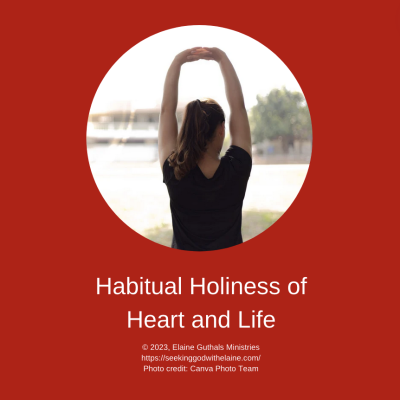
It has been a while since I have done a newsletter. I am the only one here at Seeking God with Elaine, unless Pastor Steve writes a devotion for me.
I like doing the newsletters as a round up for the month. That is also to help me do a review at the end of the year.
Hopefully, this year, I will do a better job of them.
Main Nuggets
- When we have a purpose, we do things intentionally and habitually (Habitual Holiness of Heart and Life).
- God wants us to submit our whole beings to Him – our hearts, our minds, our lives – everything (Habitual Holiness of Heart and Life).
- We may not think in the heat of the moment, but our character is built by our previous thoughts. When we act in character, we are acting out our thoughts (Making Our Habits Glorify God).

Forming Our Habits to Grow Our Relationship with God
- We are not our own because the God Who created us paid the price to redeem us after we became corrupted. He had to purchase us to restore us. It cost Him big time to do that. God really wants us restored to Him. It is God’s desire that everyone be saved. Unfortunately, not everyone will (Habitual Holiness of Heart and Life; Consistency Because of Respect When There Are Issues).
- God doesn’t have to work hard to create us. Since we have free will to make our own decisions, He makes every effort to convincing us to accept His gift of salvation (Consistency Because of Respect When There Are Issues).
- Being set apart doesn’t mean we are in a partnership with God. We are not God’s equal any more than we can live without Him (Habitual Holiness of Heart and Life).
- We don’t want to get the mistaken impression that God needs our glory to be God. He is God whether or not we worship Him. The main point is God wants us to worship Him. We worship Him because of His greatness (Habitual Holiness of Heart and Life).
- We glorify God when we understand His character. That means we have read His Word enough to know Who He is. We take our thoughts and want to honor God (Holiness of Heart and Life; Making Our Habits Glorify God).
- Since the body is described as a temple, it is a place of worship. God lives in a regenerated heart (Habitual Holiness of Heart and Life).
- We have to be as laser focused as Jesus was. We have to think God before any other thought or action (Habitual Holiness of Heart and Life).
- Stopping the focus on sin is good, but we have to switch that focus to God. If we don’t, we haven’t gained salvation. Knowing about God’s Plan of Salvation isn’t enough. Jesus is not our Savior and Redeemer until we genuinely ask Him to be (Habitual Holiness of Heart and Life; Making Our Habits Glorify God).
- We have to delight in God’s Will (Making Our Habits Glorify God).
- We take the focus off us and what we want and are feeling. We focus solely on God and His directives. We trust Him as we become totally dependent on Him. Focus on God instead of ourselves can be tiring as we are selfish (Committing Our Cares to God; The Danger of Weariness from Consistency (Part 2)).
- We must trust God daily today so that we walk with Him. We must follow through with any oath we make to God. God must be able to count on us to do what we say. We must submit our lives to God rather than just declaring to know Him (Committing Our Cares to God; Well Doing Is not Just NOT Doing Evil).
- Even though we are not to be of the world, we must serve God in it. If we isolate ourselves from the world, they will not learn of Jesus, their Savior and Redeemer. We don’t want them to not give their lives to Jesus. They need us (Consistency Because of Respect When There Are Issues).
- We can’t just give lip service to God and think that is going to buy us fire insurance. We can’t even just change some of our outward behaviors and think we’ve got it covered. Our inmost places have to be transformed. We can’t do this. Only God can (The Danger of Weariness from Consistency (Part 2)).
- The sacrifice required is our obedience. It has to be a holy and acceptable sacrifice to God (The Danger of Weariness from Consistency (Part 2)).
- We generally think of living sacrifice as it being a life-long commitment tonGod. We also need to look at it as we are “… dead to sin but alive to God in Christ Jesus” (Rom. 6: 11 NIV). This means we don’t compromise with the worldview. Another way is to think of it as a continual sacrifice — we need to be consistent (The Danger of Weariness from Consistency (Part 2)).
Glossary

Forming Our Habits to Grow Our Maturity
- Who we are and what we are isn’t the most important thing about us. Our worship should be about Who redeemed us, not ourselves (Habitual Holiness of Heart and Life).
- Following God means we will have to be rebuilt. Our temples/bodies have been corrupted by sin. The weight of the flesh makes us weary. We were created to be something different than we are now. That creates a conflict within us that weighs on us (Habitual Holiness of Heart and Life; Committing the End to God).
- Our bodies are not to be idolized because they are our bodies. It has nothing to do with our looks or intellect – or anything else of a physical nature. It has to do with Who dwells within us. We are to glorify God Who is with us (Habitual Holiness of Heart and Life).
- Our thoughts impact our lives and how we glorify God (Making Our Habits Glorify God).
- Upon regeneration, we become new creations. But how many times do we struggle with seeing ourselves as new creations? Don’t we continue to see all our past sins? Being a new creation, God sees us through the blood of Christ. He sees us how we will be upon sanctification (Consistency Because of Respect When There Are Issues).
- We need to see ourselves as the pure disciple that God sees – even when we know we aren’t. No, that isn’t supposed to make us proud or entitled. It shows us our potential – what we are supposed to be. When we begin with a picture of us as God sees us, our actions stem from that picture. It is better from that picture than a picture of sin. We are to respect ourselves as we see us the way God sees us (Making Our Habits Glorify God; Consistency Because of Respect When There Are Issues).
- A big caution – we can’t make the decision of what to do with the knowledge of our Savior based on worldly things. We will never understand everything about God and what He has done and why. God doesn’t want us to stop at either the thinking stage or the want-to stage. He wants us to follow through to the doing stage. No, we don’t do to earn salvation. We do in the process of sanctification (Making Our Habits Glorify God).
- We follow through with our thoughts and desire by putting them into action by obeying God’s commandments (Making Our Habits Glorify God).
- Jesus wants us to read His Word, take His commandments to heart, and obey. He wants us to make the progression: believe, love, obey. We are to imitate Him! There is certainty that — when we love Him — we will be obedient (Making Our Habits Glorify God).
- We must be committed to the end to persevere, endure, and be diligent. It is about attitude. Even though we might want to grow weary doing God’s Will, we don’t because we love God and want to be obedient to Him. We have to be content even when we have the pull to discontentment (Committing the End to God).
- Obedience — and therefore, commitment — has to begin with humility. That is a hallmark of our Christian faith (Committing Our Cares to God).
- We think we work for God to get kudos and to gain skills and knowledge. We see ourselves being elevated. No, God uses us to show it is not us. God wants our hearts changed to get to the point we can entirely commit to Him. We must submit everything to God so that our character will be changed to imitate His (Committing Our Cares to God).
- We need to commit to both meditate and pray. We tend to understand that we need to pray to God. We may not understand that meditation is not a sign that we are following someone other than Him. Meditation is an important part of our commitment to God. Our words have power, but their foundation is in our meditation of the heart. Our prayer lives are the foundation for our lives (Committing Our Ways to God).
- We have to recognize our need before we can ask God to fulfill that need. We have to commit to meditating so that we know what we believe before we come before God to glorify Him. The words and beliefs are not going to magically appear in our prayers. We have to put some thought into them first (Committing Our Ways to God).
- Meditation is more the contemplation of all God is telling us — through the Holy Spirit, His Word, others — however He is talking to us. We have to think about how we believe and apply what He is telling us (Committing Our Ways to God).
- God wants us to carefully consider what He is teaching us as we navigate the Sanctification Road. We have to consider that about which we are making a decision. We need to commit to God to trust in Him even when we can’t figure everything out. We have to choose to commit to God regardless of the situation in which we find ourselves. We have to choose to depend on God in the easy times and the hard times (Committing Our Ways to God).
- Commitment must contain obedience. If it doesn’t, it isn’t true commitment. We can’t begrudgingly commit. This has to be a all-in/ecstatic-about-our-decision commitment. Committing to God becomes our way of life, regardless of our emotional state. We want to be committed to the end, so we don’t grow weary and give up on God or godliness. We have to be faithfully, diligently navigating the Sanctification Road at the end. “But the one who endures to the end will be saved” (Mt. 24: 13 ESV). (Committing Our Ways to God; Committing Our Cares to God; Committing the End to God).
- Perseverance, endurance, diligence all must contain an element of commitment to ensure successful attainment. If we aren’t committed to the end, perseverance, endurance, and diligence gain us nothing (Committing the End to God).
- Our beliefs have to be focused on God. We have to be doing our utmost in performing all He requires of us. That takes it beyond performing worldly duties for worldly accolades.
- It all comes down to trusting God. We have to trust Him enough to give up control – to accept we aren’t going to understand everything and be okay with Him orchestrating our growth (Committing Our Cares to God).
- We are not to grow tired of doing God’s Will. His Will is that we follow His laws and commandments, so that we gain His character. God will work everything out so that, when we have submitted ourselves to Him, we gain His character. We complete His work and grow closer to Him (Committing the End to God).
- Losing our commitment to our purpose — growing weary in doing good — allows Satan to tempt us into disobedience. We have to be persevering and enduring because, since we are doing God’s Will, Satan will be bombarding us with temptations and trials. We can’t grow weary in our fight against Him (Committing the End to God).
- Things aren’t always just going to fall into place because it is God’s Will. Oh, we’ll see and feel the clicks when they do. But there could be some testing there, too. God could be checking on our commitment. If we are only committed during the good times when we get the great rewards, we really aren’t committed to Him (Committing the End to God).
- Hope is really important because when we are doing God’s work, it probably isn’t going to be a success story right out of the gate. It is going to take a while (Committing the End to God).
- If we are doing God’s Will as He asks us to do, we are not failing. We may not be succeeding by a worldview definition, but we are succeeding at doing His Will. The good is doing God’s Will (Committing the End to God).
- The worry takes the focus off God and makes us doubt Him. We really aren’t going to succeed then! (Committing the End to God).
- How we handle our afflictions and adversities is one of our best witnesses. This is us showing what it means to cast our cares on God and reveals the benefits of so doing. We show others what it looks like to daily life rely on God (Committing Our Cares to God).
- God’s care has no element of agitation or distress. He has it all under control (Committing Our Cares to God).
- The best thing is that God knows exactly what we are going through and feeling. He knows how what we are going through is going to affect us (Committing Our Cares to God).
- Anxiety takes our focus off God and puts it on whatever the affliction is. It distracts our heart, which we know is the seat of our thoughts, intellect, will, and affections that produces our character, from which all things spring, including controlling our spiritual position (Committing Our Cares to God).
- Well doing has nothing to do with our feelings. Our hearts are delusional. That delusion is fostered by the sin in them. We have to choose to rely on God’s Word and His promises (Well Doing Is not Just NOT Doing Evil).
- Sanctification can be a roller coaster of emotions for us. Hopefully, the majority will be positive feelings. However, we can feel doubt, confusion, anxiety, indecision, and inadequacy among a whole host of other negative things. These feelings can be exacerbated when we become weary (The Danger of Weariness from Consistency (Part 1)).
- We can’t just go on feelings. When the doubt, confusion, anxiety, indecision, inadequacy, etc. comes, we have to stand firm on our conviction of faith (The Danger of Weariness from Consistency (Part 1)).
- We are not to grow weary in anything we are called to do. God may have brought us in at entry level when we think we need to be CEO. We shouldn’t grow weary doing entry-level work. We are to do the work to the best of our abilities. We shouldn’t mess around but get the job done. We should work the full time required (The Danger of Weariness from Consistency (Part 1)).
- The writer of Hebrews told us to stand firm. That was the way we would gain the reward. We were told to keep our confidence. That is a product of faith (The Danger of Weariness from Consistency (Part 1)).
- Instead of courage, we should see confidence as assurance of our belief in God’s goodness and power. We can put our faith and trust in Him (The Danger of Weariness from Consistency (Part 1)).
- Many times, we think of consistency being what we do — as opposed to not messing up. A big element of doing right is consistently putting our trust in God (The Danger of Weariness from Consistency (Part 1)).
- We are to prepare ourselves before Satan sends the temptations. We do this by searching for and seeking God. We have to grow ourselves on the Sanctification Road so that we are prepared to be obedient (The Danger of Weariness from Consistency (Part 2)).
- Our joy comes from God. He gives it to His obedient children (The Danger of Weariness from Consistency (Part 2)).
- The trials are going to come. We have to be prepared for them. We can only fight them when we have on the armor of God (The Danger of Weariness from Consistency (Part 2)).
- The only way we become holy is by navigating the Sanctification Road. Becoming holy take consistency and commitment. That opens the door to weariness (The Danger of Weariness from Consistency (Part 2)).
- When we are God’s children, Satan is going to hound us if we are obedient. He is going to do everything in his power to get us to turn from God (The Danger of Weariness from Consistency (Part 2)).
- Our fears can only go away when we consistently focus on God. We do that through faith (The Danger of Weariness from Consistency (Part 2)).
- That is consistency. Faith takes the hits and keeps on standing (The Danger of Weariness from Consistency (Part 2)).
- Working for the Lord in the transformation process can be wearisome (The Danger of Weariness from Consistency (Part 2)).
- The focus is on God. The work is the transformation (The Danger of Weariness from Consistency (Part 2)).
- We are working to bring the graces and virtues into true and strong application. We do the did-them-to-the-least-of-me acts of kindness (Mt. 25: 35-36) to get the graces and virtues up and running and getting stronger (The Danger of Weariness from Consistency (Part 2)).
- The bigger the picture we get of God’s truth, the happier we are. We get that bigger picture by habitually conforming and submitting to what God calls us to be — the image of Him (The Danger of Weariness from Consistency (Part 2)).
- The two are linked together — doctrine and practice. If we do the practice without the foundation, there is no stability. And, boy, does that lead to weariness! (The Danger of Weariness from Consistency (Part 2)).
- If it is going to be a call for the duration of our lives, we must not get weary because we have an important task. We are to serve God (The Danger of Weariness from Consistency (Part 2)).
- Having all the virtues isn’t enough. We have to have the holiness that goes with them. Being a good person isn’t enough. We have to have God to go with that (The Danger of Weariness from Consistency (Part 2)).
Glossary

Forming Our Habits to Grow Our Relationship with Others
- We are to act in a way that others see God within us. To do that, we have to guard our habits to make sure they are in God’s Will (Habitual Holiness of Heart and Life).
- Knowing the end was near, Jesus prayed one final time for his followers. With death breathing down his neck, Jesus prayed not for their success, their safety, or their happiness. He prayed for their unity, as they would fulfill his purpose. He prayed that they would love each other, as they went forward to love the world to him (What Is the Purpose of the Church?).
- Unity creates belief. If unity creates belief, then disunity fosters disbelief. Disunity is not merely a scandal for unbelievers; it is also a stumbling block for them coming to faith (What Is the Purpose of the Church?).
- Nowhere, by the way, are we told to build unity. We are instructed simply to keep unity (What Is the Purpose of the Church?).
- Unity grows as we learn to accept other’s differences and to forgive when wronged. Unity continues as we humbly serve those who are different. Unity is fulfilled as focus on who we believe in rather than what we believe in. Unity is favored as we lovingly take the message of Jesus Christ to a divided world (What Is the Purpose of the Church?).
- Where in the Bible does it say that the purpose of the church is to make disciples happy? Where does it say we are supposed to focus on ourselves? All the verbs in the Great Commission are action verbs directed at God and others, not us (What Is the Purpose of the Church?).
- All believers must be unified, not just leaders (What Is the Purpose of the Church?).
- Unity doesn’t begin in examining others. It begins in examining ourselves (What Is the Purpose of the Church?).
- Unity is fulfilled by looking at Who we believe in, not what we believe (What Is the Purpose of the Church?).
- On the last night of his life, Jesus prayed a prayer that stands as a citadel for all Christians, “I pray not only for these, but also for those who believe in Me through their message” (John 17:20) (What Is the Purpose of the Church?).

Miscellaneous
- The starting point for every church should be the question, “Why do we exist?” Until we know what our church exists for, we will have no foundation, no motivation, no direction, and no unity (What Is the Purpose of the Church?).
- While each disciple had a different task, they all had the same calling: to fulfill the Great Commission in their generation. They had one leader – Jesus, one purpose – to communicate the gospel to all people (What Is the Purpose of the Church?).
- All the early believers were unified. There was fundamental solidarity of love and purpose. To be one in heart and mind is to be unified in every fiber of their being.
- They shared the same spiritual father – God Almighty. They shared a spiritual birth – they were born again into the family of God (What Is the Purpose of the Church?).
- They shared their lives and their possessions with one another. It went beyond a kind word and a pat on the back. They gave priority to meeting the physical and practical needs that were evident in the community (What Is the Purpose of the Church?).
- These men and women shared an enterprise together. They did not assemble merely for family gatherings or for making sure their physical needs were met. They came together to attain an objective. These men and women were partners in reaching the world for Christ (What Is the Purpose of the Church?).
- The members of a church are a group of people from various backgrounds with different interests and different perspectives who have been called together for a purpose. That purpose is to cooperate together in reaching out beyond our walls so others can know the love of Jesus Christ (What Is the Purpose of the Church?).
- As soon as the Spirit came upon the church, Satan launched a ferocious counterattack. Pentecost was followed by persecution (What Is the Purpose of the Church?).
- The early Christians quickly realized that their diversity could either be a source of division or a source of power. They chose the latter. They were not all alike. There was a plethora of opinion, a wide assortment of gifts, but they found ways to integrate their differences into a symphonic whole – to create a singleness of spirit, of identity, and of purpose whose unifying center was Christ (What Is the Purpose of the Church?).
- Because the early disciples were unified in purpose, and because they were committed to the task of reaching the world with the gospel of Jesus Christ, God smiled down on them with favor. “… and great grace was on all of them” (Acts 4:33) (What Is the Purpose of the Church?).
- God does not force us to accept His gift of salvation. He allows us free will to choose to obey Him or disobey Him (Election and Free Will).
- We are not entitled to be children of God just because we are breathing. God wants us to make a conscious decision to follow and submit to Him (Election and Free Will).
- Election also does not mean that we can never be disobedient again after we have gained salvation. God could have made us perfect (i.e., mature) upon conversion, but He chose not to do so. Instead, we are to work out our salvation (Election and Free Will).
- We are supposed to choose to not want to sin. We are supposed to imitate Jesus and be so committed to God that we are obedient (Election and Free Will).
- Election and free will are not contradictory. Election talks about mankind as a whole. Free will is personal. We need both to be offered the Plan of Salvation. God has to want our relationships restored, and we must choose to do that (Election and Free Will).
Glossary

Making the Connections
One reason I like doing newsletters is that I get the opportunity to go through and correct any mistakes I have made. Once in a while, I will find where I seemingly said contradictory things.
I found what might be confusing to some, so I thought I would address it here.
- Just like the American Dream of all having a success story that promotes them to a higher level of society, many think we have the Religious Dream that we gain many worldly things because we become disciples of Christ. True, one purpose of the church is the edification of the saints, but that isn’t the Church’s marching orders. They are “Go therefore and make disciples of all nations, baptizing them in the name of the Father and of the Son and of the Holy Spirit, teaching them to observe all that I have commanded you. And behold, I am with you always, to the end of the age” (Mt. 28: 19-20 ESV) (Consistency Because of Respect When There Are Issues).
- We can’t just think of things and not want to put feet to them. We can’t think and not let it change us (Making Our Habits Glorify God).
When I was reading through this, I thought it may sound like our sanctification isn’t necessary. It is.
Loving God is first. We have to ABCD and submit our lives to Him. We have to navigate the Sanctification Road to ensure our character imitates God’s.
The purpose of the church is to worship God. If we come to the service thinking the Praise Team is going to get us into the mood to worship and in the right frame of mind, we’ve lost sight of its purpose.
The song service is where we worship God, not a prelude.
The edification of the saints is more getting them to grow in their relationship with God than getting them a prosperity gospel with warm fuzzies (Consistency Because of Respect When There Are Issues).
Navigating the Sanctification Road is a daily thing, not a Sunday morning thing. We can’t abdicate the responsibility of that to the Church. We are in charge of that ourselves.
To me, this is talking about the fulfillment of the Greatest Commandments. We have to love God and others.
Our sanctification must come first, but it cannot be done without the doing. But listen to this.
Blessings are in the obedience, not in the doing. It isn’t that we feed the hungry. It is we are obedient to God’s directing us to feed the hungry – whether it be physically or spiritually (Making Our Habits Glorify God). It is feeding the hungry in God’s name.
If we do without believing, we aren’t doing for God. We are doing for ourselves or because it may be the right thing to do (Holiness of Heart and Life). Doing these actions show how sanctification is changing our heart and character. Our relationship with Jesus has to permeate our lives, actions, thoughts, speech – everything (Making Our Habits Glorify God).
Most importantly, we should not grow weary in working out our salvation (Phil. 2: 12). Our work is to witness for Him. We are to share His love with others (The Danger of Weariness from Consistency (Part 1)).
Glossary
To read devotions in the Habitual Holiness for Heart and Life theme, click the appropriate button below.
What do you think?
Leave me a comment below (about this or anything else) or head over to my Facebook group for some interactive discussion.
If you don’t understand something and would like further clarification, please contact me.
If you have not signed up for the email daily or weekly providing the link to the devotions and the newsletter, do so below.
If God has used this devotion to speak with you, consider sharing it on social media.